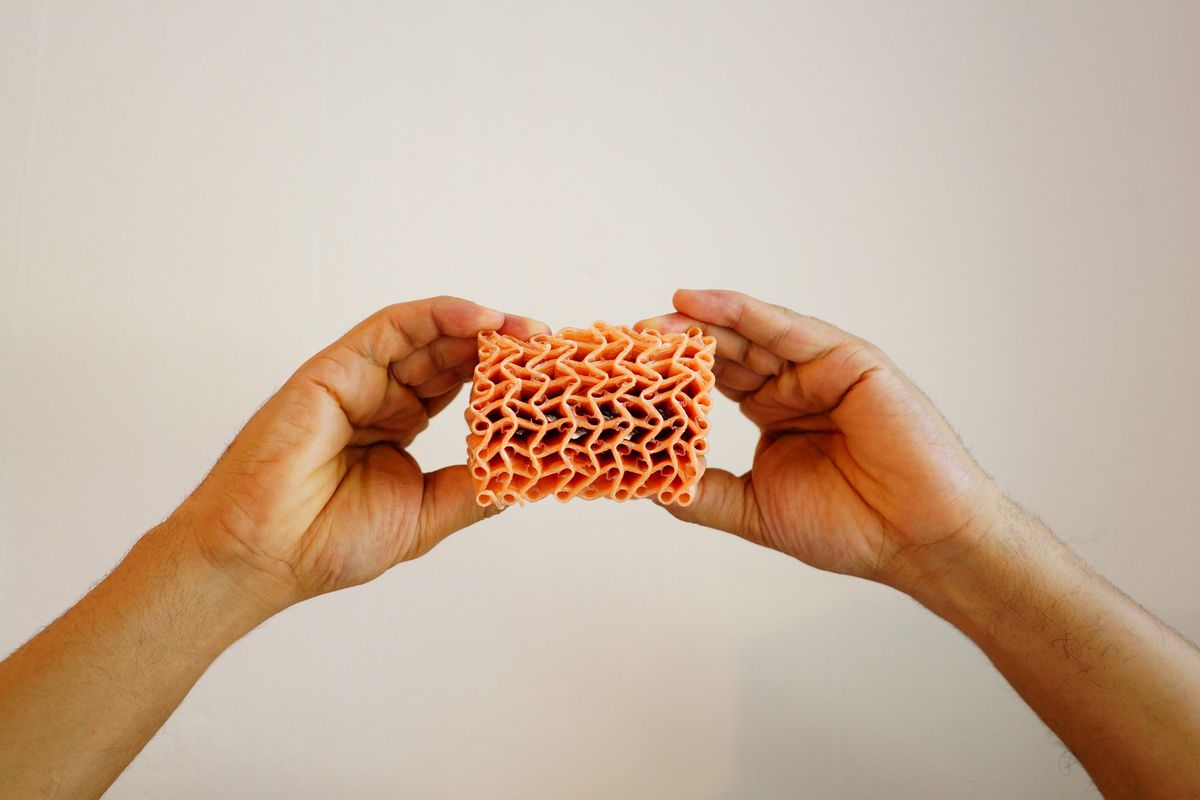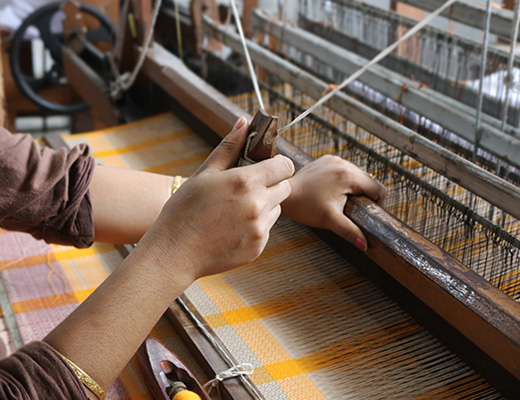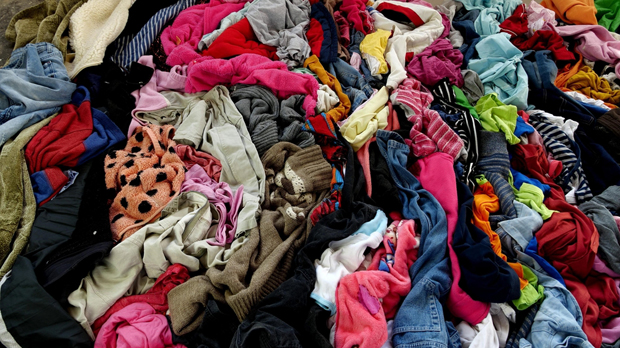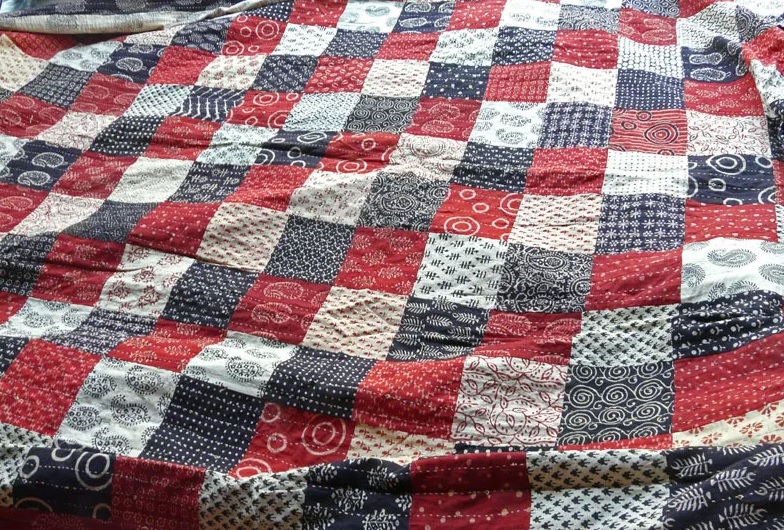FW
Huge losses are being reported by owners of silk handlooms makers in different villages of Sadar and Shibganj districts of Bangladesh due to the ongoing blockade enforced by BNP-led alliance since January 6. This has resulted in temporary joblessness for hundreds of handloom workers. An owner from Laharpur village in Sadar has stated that his business had virtually stopped due to the blockade and he suspended production. Over 250 other handlooms at the village also stopped weaving. Owners who have taken loans from banks and NGOs are now worried about timely payments.
Workers, who usually earn Tk 250 to 300 a day for weaving silk, have reported difficulties in running day to day life due to the country-wide blockade. Around 2,500 weavers work at as many handlooms in the district, said an office-bearer of the Baroghoria union weavers association. Elaborating further, he said that wholesalers from different places cannot come to the district for buying clothes including saris, scarves, shirt, kurta pieces, and curtains due to the blockade. Weavers cannot send the items either.
With the setting up of India's first yarn bank in the powerloom clusters of Ved Road and Pandesara in Surat, the country’s largest man-made fabric (MMF) centre, hundreds of small and medium power loom weavers will have direct access to polyester yarn at concessional rates. The Union ministry of textiles has formed two special purpose vehicles, Ved Road Art Silk Small Scale Co-operative Federation and Pandesara Weavers Co-operative Society, for setting up the yarn banks.
These banks have been started with an initial corpus fund of Rs 1 crore for purchasing yarn from the open market and selling at concessional rates to its initial 1,000 member weavers. The yarn banks would provide an opportunity to the weavers to arrest the price fluctuations and curb the presence of the middlemen. The yarn banks will allow the weavers to procure yarn on credit and repaying the amount in installments.
Surat has around 5.5 lakh powerloom machines producing three crore meters of fabrics every day and employs around seven lakh workers. As per the official of Ved Road Art Silk Small Scale Co-operative Federation, there are more than one lakh weavers in Ved Road and Pandesara clusters and the yarn bank will be catering to only 100 units initially. It has started approaching the frontline spinners for the bulk procurement of yarn on concessional rates.
The yarn bank will serve twin purposes. Firstly, it will get yarn samples from around the world and store it. The domestic industry can get access to yarn samples of global standards and do further research and come out with innovative products. Second is the price benefit.
Muharrem Kayhan will be the global president of the Textile Institute from 2015 to 2017. Kayhan is from Turkey and a textile engineer with MBA. At present Kayhan is chairman on the board of Soktas. The company produces shirting fabrics in Turkey and India and has investments in the dairy sector. He has represented the interests of the Turkish textile industry at various European Union platforms.
He has served on the boards of the Aegean Chamber of Industry, the Exporters’ Union, and the Turkish Textile Employers’ Union of which he is currently president. He has served as the chairman of the Turkish Industrialists’ and Businessmen’s Association between 1997 to 1999 and is now one of its honorary chairmen. He received the Turkish National Assembly Distinguished Service Award in 2009.
The Textile Institute is the leading professional body in textiles, clothing and footwear industry. It is a unique membership organisation for textile professionals and serves textile related industries worldwide. It was incorporated in England by a royal charter granted in 1925 and is a registered charity.
The aim of the institute is to facilitate learning, to recognize achievement, to reward excellence and to disseminate information within the global textile, clothing and footwear industries.
www.texi.org/
Textiles constitute 12 per cent of India's total forex earnings. They have the potential to be the prime source of foreign exchange. To fully exploit this potential, loans for the textile sector should be given at an interest rate of seven per cent. This step will encourage investment in the sector and reduce the interest payment burden of textile exporters.
Cost of credit is a major source of concern for the Indian textile industry. Interest subvention is a support for India’s textile exports and it should be continued for all textile product categories. The policy should give a clear visibility of continuity of interest subvention for the next three to five years.
India’s share in the world textile market is a mere four per cent compared to China’s 35 per cent. If India desires to enhance its global share, it should focus on scale of operations. Scale can be achieved through investments in mega textile parks. A new scheme of incentives for setting up mega textile parks can be a game changer for the future of the textile industry.
The textile industry faces difficulties in getting TUF refunds. This entire process takes around five to six months. Exporters lose working capital for this period. The procedure should be simplified. Banks should pay up the industry’s claims and in turn claim refund from the government.
Gram Vikas Sangh, an industry body of khadi weavers that organizes Khadi Gram Udyog Vikas exhibitions, has appealed to Prime Minister Modi extend the deadline to attain mandatory 'Khadi mark' certificate for weavers so that they can participate in exhibitions. Khadi and Village Industries Commission (KVIC) has made it mandatory for weavers and exhibitors to get 'Khadi mark' on their products from Ministry of Micro Small and Medium Enterprises (MSME) and the last date for the same was December 31, 2014.
'Khadi mark' has been introduced by MSME, which ensures purity and genuineness of hand woven textiles, such as cotton, wool and silk. However, since getting the khadi mark is a lengthy process, almost 90 weavers despite applying for the khadi mark are not participating in the ongoing exhibition because of the said rule. So the industry body has written to Modi, asking him to extend the deadline till March 31, 2015.
Sale of khadi, a hand-woven cloth, registered a six per cent growth in 2013-14 across the country, while the gain in production during this period was by about 6.45 per cent. The success of this eco-friendly fabric has been attributed to khadi’s introduction in the field of fashion and rise in demand for khadi ensembles among the youth.
www.kvic.org.in
Thousands of Rangoon's factory workers are on strike until they receive a pay rise. Workers from at least three garment factories are involved in the strike. All three factories have been forced to cease operations since early February. Garment factory workers earn about $50 per month plus overtime.
A minimum wage law was passed in March 2013, but setting a wage has been deferred because the Ministry of Labor has yet to conclude a study on workforce size, living standards and household expenses, which begin in late January after a two-year delay. There has been a sudden increase in wage-related strikes throughout Myanmar’s industrial zones over the past two years.
Workers’ low incomes have resulted in criminal offences, decreased productivity, conflict with employers, unethical behavior, corruption and other serious social consequences. Garment-makers say, prominent former political prisoners are getting involved in labor disputes. They say many of the city’s strikes are initiated by political groups. Under Myanmar’s long-ruling military junta, strikes were a taboo and trade unionists jailed and deemed terrorists, but the civilian government has passed laws allowing unions and industrial action. Strikes have become more commonplace since 2012.
More strikes are likely in the run-up to national elections slated for late 2015.
The Italian textile industry is among those that have been the most affected by globalization and the economic crisis, but it is now seeing light at the end of the tunnel. The sector showed clear signs of recovery in 2014 and this upturn was made possible due to its ability to react with strong innovation and greater internationalization, while preserving an enduring its tradition of excellence. talian fabrics sales increased by 3.8 per cent last year, with an overall turnover exceeding the €8 billion threshold for the first time since 2011.
Exports grew by 3.3 per cent and domestic demand rose by 4.4 per cent after years of either stagnation or decline. Trade surplus of fabrics contributed 25 per cent to the surplus of the whole textile and clothing and fashion industries. Many companies are focusing on innovation, and creating original products in terms of new shapes, colors, and fabrics to compete on the global market.
During the last few years the Italian textile industry has been moving out of basic textile product segments and focusing on end product segments. The segments concentrated on are pullovers, apparel and underwear. Producers are typically small to medium, operating in niche markets although there are also multinational groups especially in the luxury segment.
After wielding intense pressure against a Bangladesh apparel maker over assaults on union leaders outside its factories, Western companies have agreed to resume business with the manufacturer, on the condition that it stays committed to halting further violence and make peace with its labor unions. VF Corp, which makes North Face and Nautica, and PVH, the parent of Calvin Klein and Tommy Hilfiger, as well as Gap, El Corte Ingles, and other companies had cut off or threatened to cut off orders from the company, Azim Group, last year over incidents at two of its factories in Chittagong.
But after weeks of negotiations, these companies have agreed to resume business with Azim because it has promised to recognize and bargain with the unions at the two factories where the violence occurred. The Azim Group has also agreed to stop efforts to oust a labor union, to pay the medical bills of a badly beaten union leader, and to allow several union officials to return to work with full back pay.
This is the first time brands have taken such a concerted action in response to the use of violence against trade unions in Bangladesh. In another incident a woman who was an union president was beaten on the head with an iron rod outside a factory that is also owned by the Azim Group.
Information Technology (IT) has created at least 40,000 jobs in the readymade garment sector of Bangladesh. This indicates the extent to which digitalization has given a boost to the biggest export earning sector of the country.
During the last one year Bangladesh has produced IT engineers and developed an IT network to provide jobs in the readymade garment sector. The old system is no more capable of handling the huge volume of activities involved in this sector.
The plan is to cover the entire sector within the IT network. As international markets are run by IT technologies, digitalization of the readymade garment trade would enable the country to further enhance apparel exports. The necessary legal frameworks have been created to introduce e-commerce and e-payment in limited areas to deliver the services in an easier, transparent and accountable manner. Measures have also been taken to introduce electronic money order and mobile cash card. With the beginning of mobile banking service, more than 1.5 crore clients have been receiving the service.
IT enables faster processes. It has been found in the automobile industry that a car that can be made in three months can with the help of IT be made in an amazing 17 minutes.
Per unit export price of spun yarn was arrested in the month of January as the month witnessed around 115 million kg of all kinds of spun yarns worth Rs 2,470 crore exported from the country implying per unit realization of $2.98 per kg, US cents 3 higher than December 2014 and 38 US cents lower than January 2014 figures. Last year, shipments were down 13 per cent while earnings in dollar term fell 23 per cent implying a 11 per cent fall in unit price realisation, as the Rupee depreciated 0.6 per cent against the dollar in the concerned months. Total 89 countries imported spun yarns from India during the month. China continued to top the list with 29 per cent lower than the value of export last year. Bangladesh was the second largest importer of Indian yarn but with reduced imports from India by 11 per cent in value and 3 per cent in terms of volumes. Egypt, the third largest importer of spun yarns in January, pushed down Turkey and South Korea which have reduced imports from India.
The fastest growing markets in January for Indian spun yarn exports were Chile, Yemen, Uganda, Australia and Venezuela with only 1.2 per cent of total exports. Oman, Botswana, Denmark, Slovakia and Serbia and Montenegro did not import any yarns from India while Hungary, France, Russia, Djibouti and Ukraine have reduced their imports from India considerably in January this year. The major new destinations for Indian spun yarns were Honduras, Cuba, El Salvador, Panama and Paraguay with US$1.13 million worth of spun yarns in January.
The man-made fibre spun yarn exports in January was up both in terms of volume and value. A total of 6.87 million kg of man-made spun yarn were exported during the month.












